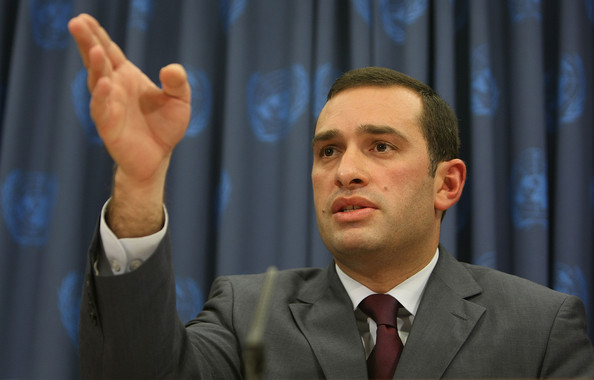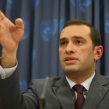
Ivanishvili’s Coalition Reveals Destabilizing Potential
Publication: Eurasia Daily Monitor Volume: 9 Issue: 63
By:

With almost cyclical regularity, Georgia’s irreconcilable opposition campaigning against the government ends up turning against the institutional state (early-to-mid 1990s, 2007 and the following years’ “summer offensives”). Motivations can vary widely, but commonalities prevail and seem perennial, including high emotionalism and imaginative representations of politics. In the upcoming parliamentary elections, billionaire Bidzina Ivanishvili’s Georgian Dream coalition poses a two-fold challenge to Georgia’s Western orientation. That challenge stems from past-oriented views on one hand and from implicit threats of destabilization on the other.
The political group Industry Will Save Georgia (colloquially: “the industrialists”), a remnant from Georgia’s convulsed 1990s, is the latest supporter of Ivanishvili’s electoral coalition. The “industrialists” stand for protectionism vis-à-vis the West and reliance on the Russian market. The group’s leader, wealthy beer producer Giorgi Topadze, still achieved a 5.2 percent score in Tbilisi’s 2010 mayoral election. Now joining Ivanishvili’s Georgian Dream alliance, Topadze offered his views on current issues.
Thus, on US economic assistance to Georgia, Topadze said, “Why did we kill our own industries? This happened because of our American ‘supporters.’…Let’s talk about what America did to our country. Why did they drown us? Why did they swamp us in debt? My colleagues and I have been talking about this for 15 years.” On Russia he noted, “We should sort out our diplomatic relations with Russia. Nostalgic feelings toward Georgia still persist there.” On Georgia’s NATO aspirations: “I do not like it when Georgians are fighting in Afghanistan. I also have my own opinion about NATO…Efforts to join NATO have ruined our country…It is clear that Russia’s ultimatum-like position [toward Georgia] is to choose between NATO and the lost territories. We could agree on this issue, if only it is not the current government that makes the choice” (Prime-Time, March 19; Alia, March 20; https://news.info.ge; https://www.youtube.com/watch).
On March 15 Ivanishvili and his top allies, Irakli Alasania and Davit Usupashvili, claimed to a large group of Western diplomats that the Georgian government is preparing for a Syria-type crackdown on the opposition. Alasania did most of the talking: “Before it is too late, before we have another Homs in Zugdidi [western Georgia] or other places, I am begging you, please start reacting.” He claimed that Georgia’s Defense Ministry and law-enforcement agencies are setting up unlawful “paramilitary groups…preparing for civil war and confrontation.” “[President] Saakashvili is not paving the way for free and fair elections; he is paving the way for the official execution of the political opposition.” “Without your interference and help it is going to be hard to prevent confrontation. Your reaction has to be very strong, solid” (Civil Georgia, March 15, 16).
On March 16, Alasania repeated for journalists that the Georgian president is instructing the military and law-enforcement agencies to set up paramilitary units for repressive purposes, ahead of the elections (Civil Georgia, March 16). The US Ambassador, John Bass, reacted by urging [unnamed] “politicians not to make allegations unsupported by facts” (Civil Georgia, March 20).
On March 20, Alasania appeared at a specially convened press conference, holding up a large envelope allegedly containing the “evidence.” He claimed to have collected the information over several months, from “patriotic citizens.” According to Alasania, the documents contained detailed information about such paramilitary units under the Defense Ministry and Interior Ministry, at multiple headquarters in Samegrelo province (western Georgia). Additionally, he had “well-founded reasons to suspect that a similar group is also being set up in Tbilisi” for persecuting, intimidating and harassing the opposition. Warning President Saakashvili to “immediately disband these units,” Alasania sent the “secret” documents to the National Security Council (NSC) for evaluation and an immediate response (Civil Georgia, March 20).
On March 23, Georgia’s NSC made public Alasania’s entire “evidence” on the NSC website, inviting public discussion. As it turns out, the allegedly unlawful paramilitary groups form part of a reserve system, within the territorial defense concept instituted by the Defense Ministry in 2011. These territorial units are neither secret nor armed, and have no headquarters (members live at home). The recruiting drive is very public and has enlisted 40,000 thus far, with an ultimate goal of 100,000. This concept stems from the experience of August 2008, when Georgia’s highly centralized reserve system collapsed, failing to mobilize reserves against Russia’s invasion. With the 2011 concept of homeland defense, the new reserve system is decentralized down to the village level. Reserve training is voluntary and unremunerated (as distinct from either conscription or professional service). The chiefs of “unlawful armed groups” on Alasania’s list are actually the senior Defense and Interior Ministry officials in charge of the territorial reserve system (Civil Georgia, March 23).
President Saakashvili and other Georgian officials have carefully avoided a polemical response to those accusations. Instead, they have reacted dismissively so as to defuse the potential for tensions.
In an accompanying statement, Alasania warned that Ivanishvili’s Georgian Dream coalition might not recognize the elections’ outcome. The coalition has commissioned an exit poll from a “world-famous organization. We and the international community will not recognize the results of the elections, if the official results do not match those provided by the exit poll.” This warning overlapped with the results of the semiannual poll commissioned by the US National Democratic Institute (NDI), which shows 47 percent support for the governing United National Movement versus 10 percent for Ivanishvili’s Georgian Dream coalition (which includes Alasania’s party). Ivanishvili has rejected the validity of this data (Akhali Taoba, March 19; Civil Georgia, March 21, 27).
Alasania is Ivanishvili’s first and foremost ally. The billionaire recruited Alasania into the Georgian Dream coalition even before the coalition’s official launch. Alasania heads his own party, Our Georgia-Free Democrats. In the 2010 local elections, Alasania polled 19 percent for mayor of Tbilisi (where the opposition’s electorate is disproportionately concentrated), while his party scored 8 percent country-wide. In the current electoral campaign, Alasania is focusing on his Samegrelo region (see above), which is, however, one of President Saakashvili’s and the governing party’s electoral strongholds. Alasania has a long career behind him in the state security and diplomatic services. Notions of legality and raison d’etat, however, seem expendable in the opposition.




